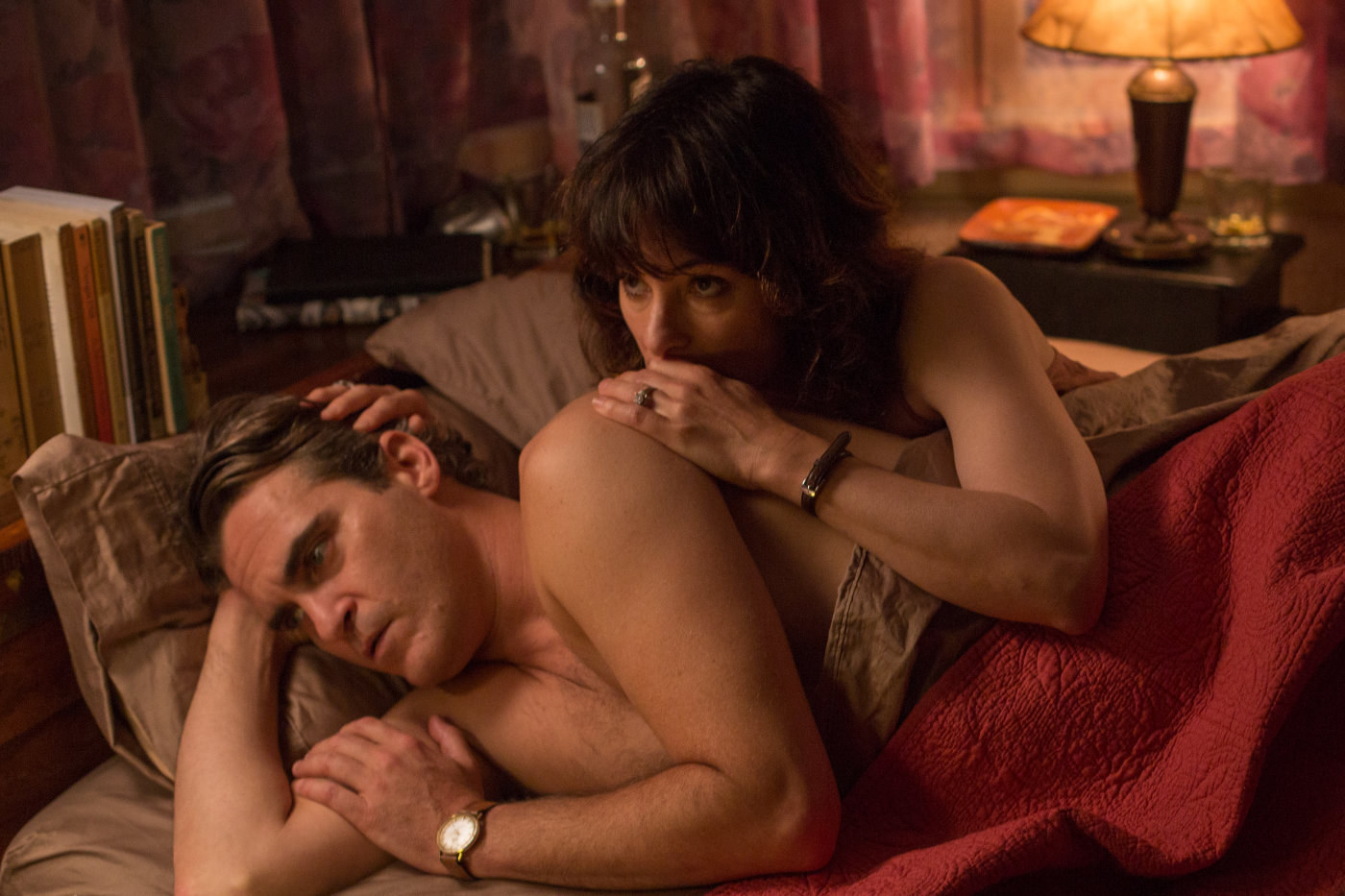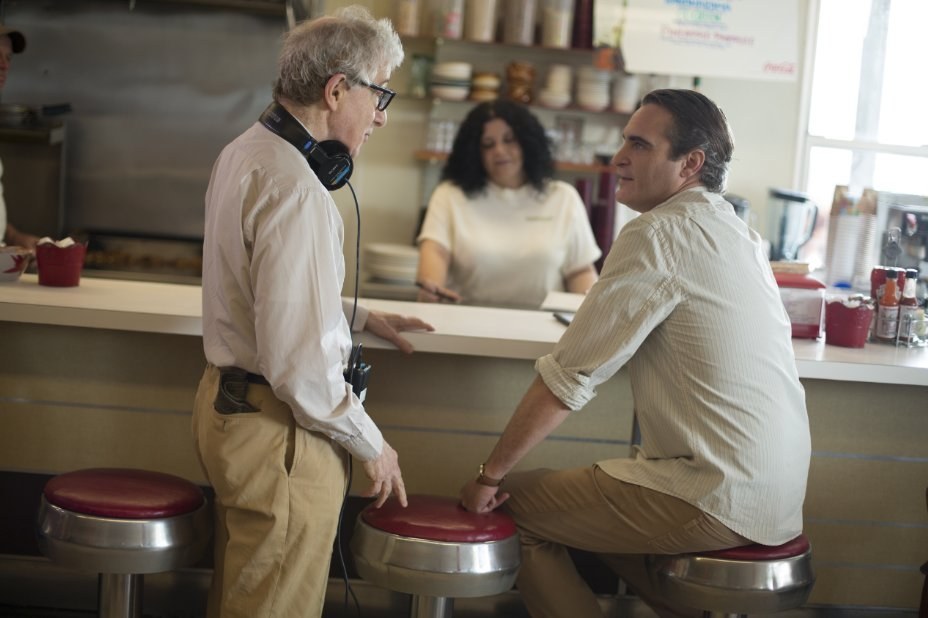
Kate Aurthur: A light-as-a-feather Woody Allen movie like last year's Magic in the Moonlight was never meant to carry any psychological load — Allen's or an audience's! — but Irrational Man could have. It's about Abe, a messy, brilliant, unstable college philosophy professor played by Joaquin Phoenix who arrives at a (fictional) luxurious liberal arts college and charms some ladies (well, two) and entertains some murder plots (well, one).
He's sexually impotent and blocked creatively, but when he starts to plan a murder — of a total stranger — he finds himself reinvigorated. Emma Stone plays Jill, his ingenue student, who falls in love with him; Parker Posey is Rita, an age-appropriate member of the faculty who is also married and desperate — and falls in love with him.
Irrational Man is meant to be a comedy, but I found it to be a tedious and light rehash. Alison, what about you?
Alison Willmore: When I saw Irrational Man at its premiere at Cannes, where Allen is so unquestioningly beloved that he could eat a squalling infant at his press conference and people would just adoringly ask why he chose to start with the feet, I wrote that at this point in his career, the 79-year-old feels like he’s remixing his past films as much as he’s been making new ones. Irrational Man, which does look brightly beautiful thanks to cinematographer Darius Khondji, at first seems like a typical Allen movie about how an older, neurotic man gets involved with a worshipful younger woman, and then turns into another sort of typical Allen movie about committing the perfect murder. There’s little in it, from the philosophical musings to the jazzy score, that hasn’t turned up in multiple works of his before.
I guess you could call this all proof of auteurism, but, Kate, it definitely feels to me more like he’s no longer really trying — and now there’s an added, maddening layer to his movies. When we discussed Magic in the Moonlight last year, we delved into some of the unintended resonances it had with Dylan Farrow’s renewed accusations that Allen sexually abused her as a child. Her letter in the New York Times was published on Feb. 1, 2014, months after Magic in the Moonlight was written and shot. But Irrational Man was made in the midst of all that, and seems unconcerned with any thematic parallels anyone might draw — even when it gets into a storyline involving the offing of a (corrupt, natch) family court judge. Is Allen indifferent to this kind of analysis, or do you think there’s something intentional going on?


KA: We'll never know the answer: His fictions seem to have always projected his real desires, and he loves an age difference in a romance. So at this point, especially in his first screenplay after the Dylan Farrow letter, which surely shook him, is he designing the older man–younger woman relationship in Irrational Man to be provocative, or because he's out of ideas and hacky? It's more interesting to ascribe anger to Allen, but given the film's toothlessness, I would lean toward the second option, I'm afraid.
It's become a fact of life that Allen releases a movie a year. But I hadn't realized exactly how many years that's been true until I went back and looked at his filmography: His streak dates back to 1982's A Midsummer Night's Sex Comedy. It's an incredibly impressive achievement.
And yet, as I sat through his latest, Irrational Man, I couldn't believe that a story about philosophy and madness and sexual obsession and murder could be so paper thin. It's vaporous; it's a wisp. It doesn't succeed as a comedy, or a deep examination of morals, or a look at the Way We Live Now. It's just there. Is Allen too prolific?
AW: I wouldn’t care about how prolific he was if it felt like he had anything new to say, but he doesn’t seem to, and it doesn’t seem to matter. Allen keeps making movies, and major stars keep signing on to them, and they’re reliably profitable enough that this cycle continues even as the end results are these faint echoes of his more distinctive earlier work. His apparently untarnished allure when it comes to actors is especially bewildering to me in the case of the always charming Emma Stone. Her part in Magic in the Moonlight, in which 28-years-her-senior Colin Firth insults her into falling swooningly in love with him, was thankless. But it’s nothing on her role in Irrational Man, in which almost every line her character utters concerns how complicated, fascinating, and attractive Joaquin Phoenix’s Abe is.
Irrational Man is, in retrospect, about a troubling episode in Jill’s life. But the movie is consumed by Abe, who, even when he’s not on screen, seems to be all any of the characters can talk about. What did you think of Phoenix’s performance? Did you buy him as the kind of magnetic figure who could so capture the idling attention of a small college campus?

KA: Phoenix is a versatile actor who can go deep, and I especially admire his performances when he's playing a sympathetic regular guy (as he did in Her in 2013) without a lot of trickery. I didn't find him totally implausible as a whiskey-bellied professor, but there's a certain upspeak that Allen seems to demand of his comedic characters these days — the prototype being Owen Wilson in Midnight in Paris — that sounds unnatural coming out of his mouth.
He's better when Abe is morose, but in the teaching segments and in the long conversations with Jill about the meaning of life, Allen doesn't do him any favors. His dialogue at its most fresh in the '70s and '80s could easily veer from a discussion of Heidegger to a name-drop of Kant, but here it feels as rote as Abe's summer survey course. I'm curious what you thought of him, Alison. And since the movie pits Rita and Jill against each other, let's — well, let's not do that. But I want to know what you thought of them, too. (I found Posey to be a delight, and in a whole other movie — a movie I might have enjoyed!)
AW: Posey is terrific in such a loosey-goosey way — the only one who’s having a good time, even if we see too little of her on screen. As for Phoenix, he’s maybe my favorite actor working today, and he does at least avoid falling into doing a Woody Allen impression, even when spouting all those oh-so Woody Allen-esque musings about whether life has any meaning. But he’s playing a supposedly brilliant character having a college freshman’s idea of an existential crisis, guzzling from a flask and giving a Russian roulette demonstration at a party. We’re aware of his appeal because the other characters inform us of it, not because of what we’re shown — “He’s very radical, very original,” gushes Jill, as he neglects to give evidence of being either.
There’s enough of a gap between the characters’ perception of him and what we actually see that it almost seems like the point — that Abe is a fraud and a sociopath who’s managed to convince others of his greatness, and has started to believe he’s a man who can get away with anything. Certainly he’s still employable, but I think that’s just me pushing for something of substance in this inert semi-comedy, because Abe is also the only person the film has any real empathy for. It doesn’t undercut his recycled philosophical quandaries, and it endorses his genius, even if it allows Jill to look naive for being so captivated by it. If there’s anything personal going on here, it seems inadvertent.
Maybe that doesn’t matter. What do you think — does this movie parallel how people keep showing up for Allen, regardless of the hollowness of his recent output and the crimes of which he’s been accused?

KA: I hadn't thought about it that way, but I like it! We'll never know who says no to Allen, but can only puzzle over those who say yes. One puzzlement is wondering what actors continue to see in his current output that makes them want to work with him. Does Stone think these have been rewarding roles for her? Does Phoenix have an auteur bucket list, and now he can check Allen off of it?
Because it must take some willful repression of certain upsetting facts to be in Allen's world. Alison, you mentioned earlier that the object of Abe's murderous attention is a family court judge. There's so little to grab onto in Irrational Man comedically and thematically, but when the scene in which he decides to murder a stranger played out in the movie, I was jarred. Most people who see Irrational Man will be at least dimly aware that Dylan Farrow renewed her accusations of rape against Allen a year and a half ago, but presumably only a small percentage will remember the small details of the ugly period in the early '90s during which Mia Farrow and Woody Allen were at war with each other: a time when a family court judge named Elliott Wilk wrote a scathing indictment of Allen's parenting that denied him custody of his three children with Farrow. It's his report that Farrow’s supporters cite as credible evidence that Woody Allen raped his then 7-year-old daughter. And the judge's conclusions about Allen — after he's laid out what he thinks happened between Woody Allen, Mia Farrow, and their children, including the rape accusations from Dylan and the uncontested origins of Allen's relationship with Soon-Yi Previn, Farrow's other daughter — begins with, "Mr. Allen has demonstrated no parenting skills that would qualify him as an adequate custodian..."
So in other words, it's a shocking autobiographical reference on Allen's part. Is there a term for an inside joke, Alison, when it's something about that time you were accused of incestuous pedophilia?
AW: I don’t know what to call it, but I’d love to know who’s laughing. When the news broke last week that Bill Cosby admitted in a decade-old deposition to giving quaaludes to women he wanted to have sex with, Mia Farrow tweeted,“Beloved funny man moralizer turns out to be a sexual predator & gets away with it we can't even think about it.” It was an observation that was clearly aimed at more than just Cosby, against whom public opinion finally appears to be turning, though it took his own confession over the words of his accusers to do it. In the face of dozens of accusations of rape, Cosby still managed to go on tour earlier this year, even joking to a woman at a show in Canada, “You have to be careful about drinking around me.”
It’s the kind of quip, like the storyline about the family court judge in Irrational Man, that seems insanely tone-deaf and, perhaps, evidence of just how bulletproof the men offering them up feel. While neither has been convicted, both Cosby and Allen have been accused of crimes that sure as hell aren’t the sort anyone should be winking about. These acknowledgments practically insist on the audience being complicit, not just taking in the men’s work, but in taking their side — not letting the allegations go ignored but making them part of the show, as if we can all agree they’re the stuff of comedy. And while I have no idea what will become of Cosby’s career, Allen’s is certainly not slowing down — he has his first ever television series due out on Amazon next year, and Kristen Stewart and Blake Lively are set to star in his next movie. Like Mia Farrow suggested, when there’s a predatory side to these legendary funnymen, we can’t even think about it — and we don’t seem to want to.

